Katyusha
Katyusha
One of the most famous melodies from the musical propaganda of the Soviet Union is undoubtedly the song “Katyusha.” Many people - including Russians - think this song is from the old Russian folklore, but nothing is farther from the truth. The tune was written in 1938 as part of the propaganda machine of the Soviet Union which, in that time, was running at full capacity. The word Katyusha is a tender nickname derived from the Russian name Ekaterina (Catherine). The name is fondly thought of by Russians for two main reasons, both emerging from the darkest days of the 20th century.
Katyusha
In 1938, as the light of peace was being extinguished across Europe once again, two Russians, composer Matvey Blanter and his poet friend Mikhail Isakovsky, wrote the score and words for a song. Katyusha tells the story of a peasant girl who longs for her beloved, who is serving far away on the border. The song evokes three themes central to the Russian psyche: the loyal girl pining for her love, the heroic soldier and the Motherland. The tune is upbeat and rousing, but the themes of love, national pride and the impending sense of war are all present. Little perhaps did the song’s creators know how Katyusha’s prophetic elements would be played out, just three years later.
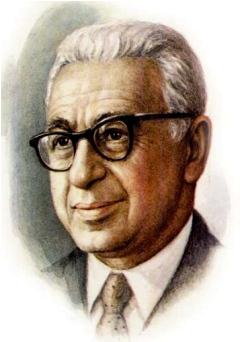
Matvey Blanter
In 1936, the Committee for Artistic Affairs made the decision to establish the State Jazz Orchestra of the USSR. Conductor Viktor Nikolaevich Knushevitsky (1906-1972) was assigned to the function of musical director. The goal was to canalize the so-called mass song in the direction desired by the regime. On November 27, 1938, the Orchestra had its first performance. It was in the Colonnade of the House of Unions, parodied by Bulgakov in Chapter 5 of “The Master and Margarita” as the Coliseum. And immediately the band made its social mission true. For the occasion, Blanter had written the song “Katyusha” on a text by the poet Isakovsky. It was sung by Valentina Batishcheva that evening, and it was an instant success.
Mikhail Isakovsky
In July 1941, the Soviet Union had already become a state full of hapless Katyushas as German armies killed or captured millions of Russian and Ukrainian soldiers. It was then, at this critical moment that female students from an industrial school in Moscow sang the song to the men marching past them to the front. The song deeply touched the soldiers and became popular throughout the USSR and Poland, a call to fight off the German Nazis.
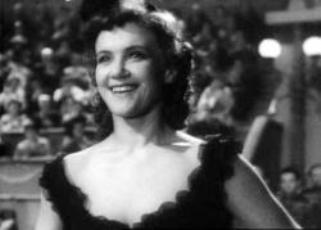
Valentina Batishcheva
When the Second World War started, the song was still very popular. So popular that the soldiers of the Red Army soon would give the nickname Katyusha to their multi-rocket launchers BM-13, BM-8 and BM-31. The letter K on their side, from the Voronezh Komintern factory where they were built, led to the adoption of the fond name “Katyusha”. According to a legend, soldiers were singing the song “Katyusha” during the shooting. The German soldiers however called them Stalin's Organs, because of their physical resemblance the pipes of an church organ.
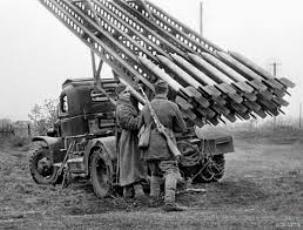
Katyusha, multi-rocket launcher
In 1943, Felice Cascione (1918-1944) wrote an Italian text entitled "Fischia il vento" to the melody of Katyusha. In that version, the tune would become one of the most popular songs of the Italian partisans in World War II, along with “Bella Ciao.”
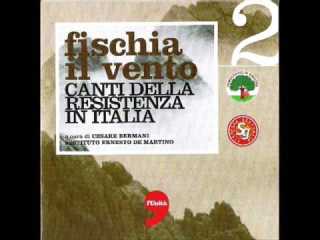
Fischia il vento (italian version of Katyusha)
Perhaps you know the melody of Katyusha better as the Casatchok. That tune became extremely popular in Western Europe in 1968. In France, for example, the instrumental version of Dimitri Dourakine was at the number 1 position on the national charts for three months in the beginning of 1969. Dimitri Dourakine is not a Russian, as you may think, he's a dealer in musical instruments from Leuven, Belgium. He had no idea of the origin of the song. He had taken the melody from the Bulgarian singer Boris Rubaschkin, who had departed far from the original text of Katyusha in 1967 when he released in under the title Ras dwa Casatschok.
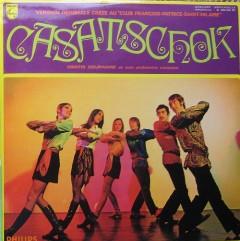
Dimitri Dourakine - Casatschok
Rubaschkin had turned the song into some kind of Bavarian drinking song in which Katyusha was replaced by Petrushka, and the theme of the war was changed into the ambiance of vodka and balalaikas.
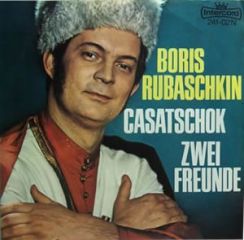
Boris Rubaschkin - Casatschok
Still today, “Katyusha” is always performed on any celebration of Victory Day in Russia, every year on May 9. In the '90s, after the collapse of the Soviet Union, the mass celebrations were reduced, but it changed again when Vladimir Putin came into power. Since then, Victory Day is again a day of massive celebrations with a great sense of national self-esteem, on which the popular culture plays a major role. The 60th anniversary in 2005 was the largest ever mass celebration in Russia, including this version of “Katyusha” by singer Irina Bilyk.

Katyusha
Катюша (Katuysha, Russian lyrics)
Расцветали яблони и груши, Поплыли туманы над рекой; Выходила на берег Катюша, На высокий берег, на крутой. Выходила, песню заводила Про степного, сизого орла, Про того, которого любила, Про того, чьи письма берегла. Ой, ты песня, песенка девичья, Ты лети за ясным солнцем вслед, И бойцу на дальнем пограничье От Катюши передай привет. Пусть он вспомнит девушку простую, Пусть услышить, как она поет, Пусть он землю бережет родную, А любовь Катюша сбережет. Расщветали яблони и груши, Поплыли туманы над рекой; Выходила на берег Катюша, На высокий берег, на крутой
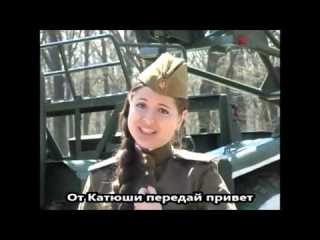
Katyusha
Katyusha, English translation by Katya (russmus.net)
Apples and pears were blossoming Mist on the river floating On the bank Katyusha stepped out On the high steep bank Stepped out, started a song About one grey steppe eagle About her loved one Whose letters she cherished Oh song, maiden's song Fly towards the clear sun And to the warrior on a far away border Bring Katyusha's greeting May he remember this simple maiden And hear her singing May he save our motherland And love, Katyusha will save

Katyusha
Katyusha, French translation by Katya (russmus.net)
Pommiers et poiriers fleurissaient Le brouillard enveloppait la rivière Katyusha descendait sur la berge Sur la berge haute et abrupte Elle descendait, entonnant sa chanson La chanson de l'aigle gris des steppes De celui qu'elle aimait tant Dont elle chérissait les lettres Oh chanson, chansonnette de jeune fille Envole-toi vers le soleil ardent Et apporte au guerrier sur la frontière lointaine Les salutations de Katyusha Puisse-t-il se souvenir d'une simple jeune fille Puisse-t-il entendre comment elle chante Puisse-t-il protéger la terre natale Et son amour, Katyusha le protégera Pommiers et poiriers fleurissaient Le brouillard descendait sur la rivière Katyusha descendait sur la berge Sur la berge haute et abrupt
Irina Bilik - Katyusha (Victory Day 2005)
Last Updated (Monday, 04 July 2016 22:38)








